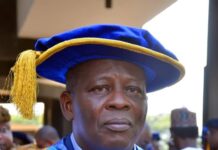 In decent societies, thorough urban and regional planning is seen as one of the veritable tools to fast track economic growth.Apart from that, it helps to ensuring a safe and habitable environment. It has been practiced under many names: town planning, city planning, community planning, land use planning, and physical environment planning. The object of planning is the “physical environment,” which is taken to mean land and all its uses, along with everything that has tangible existence on or beneath the land surface. Planning also includes the manner and style by which buildings are laid out in a city, and the design of public places.
In decent societies, thorough urban and regional planning is seen as one of the veritable tools to fast track economic growth.Apart from that, it helps to ensuring a safe and habitable environment. It has been practiced under many names: town planning, city planning, community planning, land use planning, and physical environment planning. The object of planning is the “physical environment,” which is taken to mean land and all its uses, along with everything that has tangible existence on or beneath the land surface. Planning also includes the manner and style by which buildings are laid out in a city, and the design of public places.
Physical environments are partly natural and partly man-made. A satisfying man-made or “built” environment is the ultimate goal of planning, but relations between natural and built environments, and interactions between people and their environments, are also of vital concerns. Human activities can have negative impacts upon the natural environment, just as certain natural conditions are hazardous to human well-being. Planners are equally concerned to protect natural environments from the adverse effects of human use (eg, water pollution), and to protect people from adverse natural circumstances (eg, flood zones).
To plan the physical environment means to impose some deliberate order upon it, with the aim of achieving a desired standard of environmental quality. Environmental quality is the heart of planning practice. Different cultures have tended to value environmental qualities differently and to organize their environments in different ways. Many factors influence the choice of qualities that are most desired at a particular time and place. Each community, through social and political processes, must set its own standards of a good physical environment. Also, people’s needs, tastes and economic circumstances influence the quality of environments that are planned and built.
A variety of issues fall within the scope of urban and regional planning, depending partly on the geographical scale of the planning area. Regional planners will be concerned with such matters as the protection of farmland or other valued resource sites (eg, forests, mineral deposits, seashores, lakeshores); the preservation of unique natural or historical features; the locations of highways and other transport facilities, such as pipelines or airports; and the growth prospects of communities located throughout the region. If the region is organized around a large city, the planners must also take account of the problems caused by the city’s expansion, and its impact upon the surrounding countryside and nearby towns. Fairly all these essential factors were painstakingly put into action under a man who truly knows his onions, Mallam Nasir el-Rufai.
Suffice to crave your indulgence for taking you through such a long intellectual excursion on what urban and regional planning should look like in a decent environment. Former Federal Capital Territory minister, Mallam Nasir el-Rufai’s excellent disposition to achieve such a world class environment which is what we witness and still enjoying today in Abuja cannot be forgotten so easily. He has proven to the world that excellence and dedication to service are not just determined by size or height but through great potentials and values within and how best one can harness and explore them in the interest of one’s motherland.
Today our nation is full of aspiring political leaders but sadly, very few live up to the leadership ideals. In fact, many political leaders seem to severely lack some of the most important leadership qualities, such as integrity and accountability. It is no coincidence that for many people, the word “politician” has such negative connotations! However, history and present day shows us that there are still a few who come close to the leadership ideals and who are good examples of an effective political leader.
It is instructive to emphasize that compassion is the humane quality of understanding the suffering of others and wanting to do something to alleviate that suffering. While many see compassion as a weakness, true compassion is a characteristic that converts knowledge to wisdom. Great political leaders use compassion to see the needs of those he leads and to determine the course of action that would be of greatest benefit to all those involved. Deciding which candidate to vote into office is simply a matter of party affiliation for many people. Others, however, cast their votes based on specific characteristics they look for in their candidate of choice. It has however been succinctly put by various stakeholders in politics that 2015 stands a defining moment in the toga of our democratic setting. Recently I read the book written by this dogged and fearless icon (Nasir el-rufai), titled ”The Accidental Public Servant” albeit I am convinced that our nation can still be great once again. May God bless Nigeria and strengthens her unity and progress.
Emmanuel Ajibulu wrote from 3 Arms Zone, Abuja.



